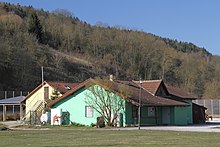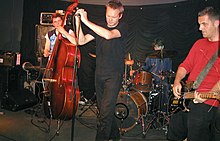club W71
The club W71 is a socio-cultural center in Weikersheim , Baden-Württemberg, founded in 1971 .
Reason for creation and history
The initiative for club W71 came about when the foothills of the 1968 movement reached the northern Württemberg province and the small town of Weikersheim. A group of Young Socialists began the cultural work with the establishment of the Film of the Month . Soon after, the first concert activities in the field of jazz and folk followed . From this the sponsoring association of the club W71 developed. The name has clear echoes of the recently founded Club Alpha 60 in Schwäbisch Hall . Originally intended as a meeting place for young people, the concept changed within a short time in the direction of what became part of the new social movements ( anti-nuclear power movement , peace movement , women's movement, etc.) from around 1980 under the term socioculture .
Concept and goals
The sponsoring association of the club is a non-profit , registered association , which is managed by an annually elected board team and represented externally. Anyone aged 16 and over can become a member. The regular board meetings are generally open to the public in order to be able to receive suggestions and feedback from all interested parties. According to the statutes, the aim of the association is “ the promotion of art and culture and the promotion of education and training ”. The main focus of the association is on public events and the establishment and maintenance of a space that offers opportunities for a wide variety of working groups. The spectrum of the working groups ranges from the organization of concerts, readings and film screenings to gymnastics or Tango Argentino . All work to organize events and to maintain the building is generally carried out on a voluntary basis .
Contemporary history in the mirror of alternative culture
jazz

The club has always offered a platform to artists from the field of free jazz and alternative music in particular . Already in the first concerts with the Polish - Norwegian saxophonist Jan Garbarek or the Polish Michael Urbaniak Group , the interest of the organizers in improvised music from Europe became apparent . Weikersheim was soon a popular venue for the Eastern European as well as the West German free jazz scene. After more than three years of preparatory work, from 1979 artists from the former GDR (such as Conny Bauer and Günter Sommer ) were always able to travel to concerts in the club W71. In the meantime it has also been shown that experimental and avant-garde music has succeeded in gaining a constant and loyal audience. While the organizers were still satisfied in the early days, “ when more spectators came than musicians ”, larger ensembles like the Peter Brötzmann Tentett or Ken Vandermark's Territory Band have meanwhile moved to the cultural center of neighboring Niederstetten . The event rooms of the Jeunesses Musicales Germany at Weikersheim Castle in their baroque splendor are also used regularly.
Communal cinema in rural areas
The club W71 emerged from an initiative by young socialists called Film of the Month . The initiative selected special films that could be shown in the local Hansa cinema once a month with the support of the cinema operator in 35 mm format and which differed considerably from the usual offerings of a small town cinema. When the operator let the film of the month expire at the end of 1971 without any further consultation with the program makers (obviously the program was not commercial enough), the initiators switched to the cheaper 16 mm format and to the new room. The low rental fees for films in this format (especially for classics from film history) made an ambitious program possible. There was a two-week interval and the films on offer offered a cross-section of German and international film, from silent films to contemporary experimental films . In the 1970s, a commercial cinema in rural areas could not afford to show films by Rainer Werner Fassbinder , Rosa von Praunheim or the documentary filmmaker Peter Krieg . The audience was happy to accept it, was always open to discussion and was also interested in seminars lasting several days on film history or a specific topic. The club W71 took on the role of a communal cinema , which has been created throughout Germany since 1970.
Folk in the 1970s
The founding time of the club W71 coincided with the rebirth of the folk movement in Germany. After the end of the Nazi regime , (German-language) folk music stuck to a negative aftertaste among the youth. But in the years after 1960 the folk from America and Great Britain became more and more popular and from 1970 the German-speaking folk movement experienced its breakthrough. Both the English-language music, as well as German-speaking representatives such. B. Zupfgeigenhansel and Fiedel Michel were present in the club for the whole decade and provided the critical soundtrack to the anti-nuclear power movement , the German Autumn or the citizens' initiative against a test track run by the Daimler-Benz group in nearby Boxberg . As the folk electrified themselves at the end of the decade, this was also reflected in the performance of the band Cochise . From 1980 onwards the folk movement subsided and so-called world music came to the fore.
Punk and world music since the 1980s
Just as rock music was to fundamentally change due to punk from the end of the 1970s , so-called world music also saw a lasting change in their listening habits among fans of more traditional music in the 1980s . Punk should transform itself from a protest movement into an established music genre. The later superstars Die toten Hosen can be named as an example of this , while other bands like Die Mimmi’s still expressly refuse to commercialize them even after 20 years. Other punk bands like the Mekons discovered influences like Hank Williams and British folk and created a hard version of country music . All of these tendencies have been taken into account in club W71.
On the other side of the musical spectrum, more and more musicians from Africa and Asia were given the opportunity to perform in Germany and Europe. If it succeeds z. E.g. the Senegalese singer and composer Youssou N'Dour was only able to get three performance opportunities in Germany (Munich, Weikersheim and Frankfurt) in 1985, if this musician would have a commercial success in a few years that would have been unthinkable before.
But if the boundaries between the genres of jazz, punk, world music and other influences are radically broken (also in the field of alternative music), it will be difficult to find suitable venues for experimental projects in 2008 as well. The club W71 was the only organizer in Germany who made a concert by the guitarists Terrie Ex and Andy Moor from the Dutch anarcho-punk band The Ex possible with the saxophonist Ken Vandermark and the drummer Paal Nilssen-Love .
In 2016, 2017 and 2018 the club w71 received the APPLAUS sponsorship award from Initiative Musik for its jazz program in “Category 3” (for small venues).
building
The club W71 building is located on the outskirts of Weikersheim, between the sports fields, ie without any immediate neighborhood. Originally a kiosk for camping visitors , the building was expanded by the association in 1974. In 1984 the building burned down completely for an unexplained cause and was rebuilt in a slightly improved form with insurance money and very high personal contributions from the members. The building has only one event room, which can accommodate around 150 people without seats.
Selection of artists who have previously performed in club W71
Franz Hohler , Floh de Cologne , Peter Kowald , Lutz Görner , Die 3 Tornados , Hannes Bauer , Cochise , Keith Tippett , Die Mimmi’s , Youssou N'Dour , Klaus Theweleit , Sainkho Namtchylak , Tocotronic , Wladimir Kaminer , Dälek , Blumfeld , Kathrin Röggla , Otomo Yoshihide , Paul Lovens , Rocko Schamoni , Siegfried Zimmigart , Dieter Bihlmaier , Ed Kröger , Günter Sommer , Fitzgerald Kusz .
Individual evidence
- ↑ APPLAUS - Award for the program planning of independent venues Website of the Initiative Musik (accessed on November 20, 2018)
Web links
Coordinates: 49 ° 29 '12.1 " N , 9 ° 53' 51.6" E



